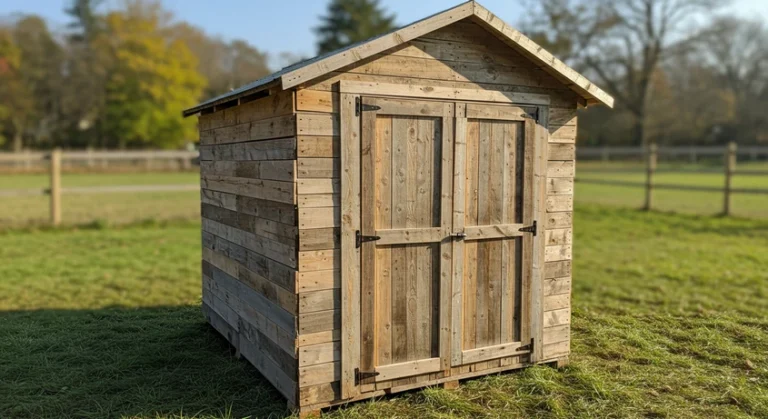Why Avoiding Common Shed Building Mistakes Matters
Building a shed is a practical project for anyone who needs more storage or a functional backyard workspace. However, many DIYers make the same errors that cost them time, money, and frustration. From choosing the wrong site to skipping essential steps in construction, these common pitfalls can easily derail your plans. This guide will walk you through 19 of the most frequent shed building mistakes—and show you how to avoid them—so your project stays on track from the ground up.
19 Shed Building Mistakes
1. Picking the Wrong Shed Location
- Placing your shed in a low-lying area can cause drainage problems and water damage.
- Tip: Choose a flat, elevated site with good water runoff to keep the shed dry and stable.

2. Ignoring Local Building Codes
- Skipping permits or failing to follow zoning laws can lead to fines or even forced removal.
- Tip: Check with your local municipality before building to understand size limits, placement rules, and permit needs.

3. Using Poor-Quality Materials
- Low-cost wood or thin panels won’t hold up against weather and time.
- Tip: Invest in pressure-treated lumber and weather-resistant roofing for a long-lasting structure.

4. Skipping the Foundation
- Placing a shed directly on the ground leads to moisture issues and structural damage.
- Tip: Use concrete blocks, gravel pads, or a proper slab foundation to ensure durability.

5. Poor Floor Framing
- Weak or uneven floor joists cause instability and sagging over time.
- Tip: Use joist hangers and pressure-treated framing lumber to support heavy storage.

6. Inadequate Roof Pitch
- A roof with too little slope can lead to water pooling and leaks.
- Tip: Follow roof pitch guidelines based on your climate. Steeper roofs are better for snowy areas.

7. Poor Ventilation
- Without airflow, sheds trap heat and moisture, damaging tools and materials.
- Tip: Add vents, windows, or a ridge vent to allow for proper circulation.

8. Not Leveling the Foundation
- An uneven base can cause structural issues and doors that don’t close properly.
- Tip: Use a level and take time to prepare a flat, stable base before starting construction.

9. Forgetting Weatherproofing
- Water infiltration can rot wood and ruin contents.
- Tip: Use weather-resistant barriers, seal joints, and apply quality exterior paint or stain.

10. Underestimating Storage Needs
- Building too small means outgrowing your shed quickly.
- Tip: Plan for future storage by adding extra square footage or loft space if possible.

11. Not Planning Door Size and Placement
- Small or poorly positioned doors make it hard to access or store large items.
- Tip: Install wide double doors and ensure they open without obstruction.

12. Improper Roof Overhangs
- Short overhangs allow rain to drip near the walls, causing water damage.
- Tip: Extend eaves at least 6 inches to protect the walls from moisture.

13. Installing Windows Incorrectly
- Poor window installation can lead to leaks and drafts.
- Tip: Use flashing tape and caulk to seal around windows and prevent air and water infiltration.

14. Skipping Gutters and Drainage
- Without gutters, water can erode the shed’s base and flood the interior.
- Tip: Add gutters and downspouts to direct water away from the foundation.

15. Using the Wrong Fasteners
- Inappropriate nails or screws may not hold up in outdoor conditions.
- Tip: Use galvanized or stainless-steel fasteners that resist rust and corrosion.

16. Not Treating Exposed Wood
- Untreated wood will weather quickly and deteriorate.
- Tip: Apply exterior-grade stain, paint, or sealant to all exposed surfaces.

17. Overlooking Insulation and Interior Finishes
- If the shed will be used year-round or for hobbies, insulation is crucial.
- Tip: Plan insulation, wall panels, and flooring from the start if you want a more finished interior.

18. Skipping Regular Maintenance
- Even a well-built shed needs upkeep to stay in top shape.
- Tip: Inspect the structure annually, clean gutters, and check for leaks or wood damage.

19. Not Securing the Shed Properly
- A shed that isn’t anchored can shift or blow away in strong winds.
- Tip: Anchor the shed using ground spikes, concrete footings, or hurricane ties.

Conclusion: Avoiding Shed Building Mistakes Pays Off
Taking the time to plan your shed build and avoid these common pitfalls will save you effort, money, and frustration. Whether it’s choosing the right location, following local codes, or using durable materials, each step plays a vital role in building a shed that lasts. By addressing these shed building mistakes early, you’ll ensure your structure is safe, functional, and ready to meet your needs for years to come.






